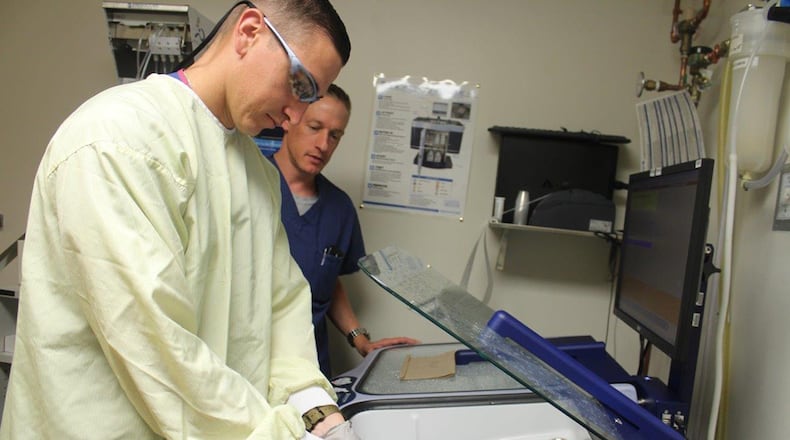“Two thirds of our procedures are colorectal cancer screenings and prevention,” said Lt. Col. Tristan Handler, 88th Medical Group chief of gastroenterology. “With early detection, if we find any growths in the colon during a colonoscopy, we can remove them on the spot before they have the potential to become cancerous.”
According to the American Cancer Society, it is estimated that 95,520 new cases of colon cancer and 39,910 new case of rectal cancer will be diagnosed in 2017.
Handler recommends making an appointment with their primary care physician if experiencing possible signs or symptoms of colorectal cancer such as unexplained blood or changes in the stool, unintentional weight loss and unexplained iron deficiency.
It is recommended that colorectal cancer screenings should start at age 50 with colonoscopies every 10 years. African Americans are recommended to start the screenings at 45, and those with a family history of colon cancer may need more frequent colonoscopies.
In addition to colorectal cancer screenings, the clinic diagnoses and treats patients with acid reflux and irritable bowel syndrome.
Acid reflux is a condition in which acid backs up from the stomach into the esophagus and throat. Symptoms of acid reflux are upper abdomen pain, heartburn, burning behind the sternum or chronic cough.
“While there are great medications available for acid reflux, it is possible to manage acid reflux medications by maintaining a normal body weight and finding food triggers that may cause the symptoms,” Handler said. “Some common food triggers for acid reflux can be caffeine, alcohol, chocolate, tomatoes, green peppers and peppermints.”
Irritable bowel syndrome is a disorder of the gastrointestinal tract that can cause frequent abdominal pain and changes in the bowels. Handler said IBS can be painful and an inconvenience to one’s work and social life; however, it can be managed with diet, trigger avoidance, and medications.
“We work with patients to help them understand that although there is no cure for IBS, we can help decrease the frequency and level of discomfort,” Handler said. “IBS can be comparable to having a headache; first tests are ran to check for any abnormalities or tumors. When nothing is found, the cause is still unknown but doctors can help treat and recommend things to do to help ease the discomfort.”
When experiencing digestive issues, Handler said many people who have IBS initially think they may have celiac disease, an allergy to a protein found in wheat products. Symptoms of celiac are abdomen pain, bloat, diarrhea and anemia, which are all very similar to IBS. However, only a very small percentage of people have the disease. Several tests can be conducted to rule out celiac.
To maintain a healthy digestive system, Handler recommends to eat in moderation by limiting red meat to twice a week, avoid processed foods, and eat foods that are high in fiber. Foods high in fiber can also help reduce diverticulosis and possibly reduce the potential for colon cancer.
To receive care at the 88th Medical Group gastroenterology clinic, patients must be referred by their primary care provider. For additional information on IBS, go to the IBS group at ibsgroup.org or for information on colon cancer, go to the American Cancer Society at cancer.org.
About the Author
